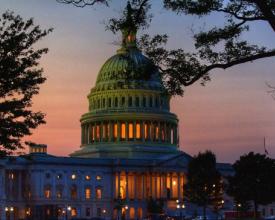DHA Pushes For Regulatory Reform
DHA continues to promote North American manufacturing of decorative hardwoods. I recently spoke to our Canadian colleagues at the Canadian Hardwood Plywood and Veneer Association Spring Meeting where we discussed trade challenges and misleading marketing by producers of fake wood products.
Our industry often faces new regulatory challenges. Thus, DHA recently signed a letter supporting legislation that would reform the approach to new regulations by requiring federal agencies to notify Congress and the public about new regulations, as well as other commonsense reforms. The EU Deforestation Regulation is an example of regulation in search of a problem—at least when it comes to low-risk countries like the U.S. Fortunately, it appears that the U.S. government is helping us make the case that EUDR should be delayed by sending that request to the European Commission.
If you have questions or comments, contact me. I look forward to hearing from you.

Keith A. Christman, President
Decorative Hardwoods Association

Earlier this month, DHA signed a letter in support of a new bipartisan bill on regulatory reform. The Regulatory Early Notice and Engagement Act would require any federal agency, within one week of initiating a new rulemaking activity, to identify the problem the rule aims to address, list why the rule is necessary, and invite public recommendations on achieving the objectives of the rule. This information would be published online and sent to Congress.
Decorative Hardwoods Association and the Canadian Hardwood Plywood And Veneer Association share many important members and face similar challenges, including unfair competition from China and misleading advertising for fake products made to look like wood. DHA spoke about how we're working to combat these challenges at CHPVA's 2024 Spring Conference in Québec.
The U.S. Department of Agriculture, Department of Commerce, and Executive Office of the President urged the European Commission to delay the implementation of the EU Deforestation Regulation. In their letter, they cite several critical obstacles that will make it difficult for U.S. companies to comply with the regulations by December 30. Their concerns echo those of a letter endorsed by DHA and several other associations that was sent to the EC in April.
In light of recent elections for the European Parliament and upcoming national elections, the European Commission may consider delaying the EU Deforestation Regulation.
In recent months, there have been numerous calls to delay the implementation of the EUDR. More and more evidence suggests that neither regulators nor the industry will be prepared. The loudest calls for delay are now coming from within the EU itself. Some government officials and many industry groups are concerned that the challenges of implementation will undermine EU competitiveness and contribute to inflation in the food sector.
Senate Republicans have released their draft framework for the farm bill, which includes important funding for our industry. The Forestry Title of the framework aims to modernize the Forest Inventory and Analysis program, provides tools for the Forest Service that will improve efficiencies in managing federal forestlands, and bolsters community wood facilities and wood innovation programs to accelerate the use of wood in buildings.
The U.S. Forest Service has published the final analysis of threats to mature and old-growth forests on federal lands, as required by executive order. The report found that "currently, wildfire, exacerbated by climate change and fire exclusion, is the leading threat to mature and old-growth forests, followed by insects and disease in the West" and that "tree cutting (any removal of trees) is currently a relatively minor threat despite having been a major disturbance historically, as from 1950 to 1990 these practices were the primary reason for loss of old-growth forests."
The American Forest Resource Council podcasters recently spoke with U.S. Forest Service representatives about the $74 million in grants they are distributing through the Wood Innovation program. The program engages public and private sector partners to support market development and expand manufacturing of wood products.
On June 10, Cabinetworks Group announced the appointment of Jeff Jackson as CEO. Jackson succeeds John Barkhouse, who has transitioned into an advisory role.
DHA member AHF Products has promoted Noah Chitty from the head of technical services for Crossville to vice president of sustainability and technical services.
European plywood producer Garnica announced that Álvaro Gonzalez will succeed Christian Michel as CEO. Gonzalez will oversee global operations, facilitate growth, and support Garnica's initiatives for its growing customer base in North America.
The U.S. Department of Agriculture and Department of Interior outlined their vision and goals for managing wildland fires this year in a joint memo to federal agency leaders with wildfire responsibilities. The memo highlights fire management investments from the administration's Investing in America agenda as well as other strategic priorities to reduce wildfire risk, restore ecosystems, engage in post-fire recovery, support the wildland fire workforce, and make communities more resilient to fire.
The Pennsylvania Department of Conservation and Natural Resources published a draft of a new strategic plan for its 17 million acres of forestland. The agency is working to find ways to keep its forests healthy while supporting outdoor recreation.
To fight climate change, the U.S. needs to replant trees after wildfires and disasters. After catastrophic fires, natural regrowth isn't enough. But, the U.S. can't keep up with the growing need to replant trees—particularly in the West.
What is the unique species that just won New Zealand's tree of the year?
Answer: The winner is a uniquely shaped northern rātā.
PHOTO © GARETH ANDREWS





